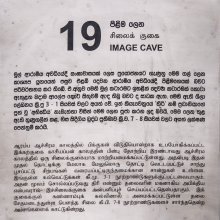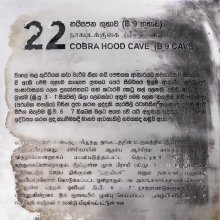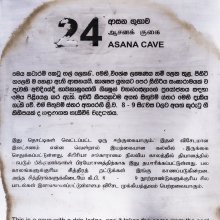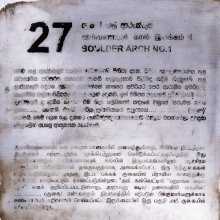Lena, Leṇa: 6 definitions
Introduction:
Lena means something in Hinduism, Sanskrit, Buddhism, Pali, Jainism, Prakrit, Hindi. If you want to know the exact meaning, history, etymology or English translation of this term then check out the descriptions on this page. Add your comment or reference to a book if you want to contribute to this summary article.
Alternative spellings of this word include Len.
Images (photo gallery)
Languages of India and abroad
Pali-English dictionary
Source: BuddhaSasana: Concise Pali-English Dictionaryleṇa : (nt.) safety; a cave; a rock cell.
Source: Sutta: The Pali Text Society's Pali-English DictionaryLeṇa, (& lena) (nt.) (*Sk. layana, fr. lī in meaning “to hide, ” cp. Prk. leṇa) 1. a cave (in a rock), a mountain cave, used by ascetics (or bhikkhus) as a hermitage or place of shelter, a rock cell. Often enumerated with kuṭi & guhā, e.g. Vin. IV, 48; Miln. 151; Vbh. 251 (n.). At Vin. II, 146 it is given as collective name for 5 kinds of hermitages, viz. vihāra, aḍḍhayoga, pāsāda, hammiya, guhā. The explanation of leṇa at VbhA. 366 runs as follows: “pabbataṃ khaṇitvā vā pabbhārassa appahonakaṭṭhāne kuḍḍaṃ uṭṭhāpetvā vā katasenāsanaṃ, ” i.e. opportunity for sitting & lying made by digging (a cave) in a mountain or by erecting a wall where the cave is insufficient (so as to make the rest of it habitable). Cp. Vin. I, 206=III, 248 (pabbhāraṃ sodhāpeti leṇaṃ kattukāmo) Mhvs 16, 12; 28, 31 sq. (n); Miln. 200 (mahā°).—2. refuge, shelter, (fig.) salvation (sometimes in sense of nibbāna). In this meaning often combined with tāṇa & saraṇa, e.g. at D. I, 95; S. IV, 315 (maṃ-leṇa refuge with me; +maṃtāṇa); IV, 372 (=nibbāna); A. I, 155 sq. (n); J. II, 253; DA. I, 232. Cp. Vin. III, 155. leṇ’atthaṃ for refuge Vin. II, 164 (n); J. I, 94.—aleṇa without a refuge Ps. I, 127; II, 238; Pv. II, 25 (=asaraṇa PvA. 80).

Pali is the language of the Tipiṭaka, which is the sacred canon of Theravāda Buddhism and contains much of the Buddha’s speech. Closeley related to Sanskrit, both languages are used interchangeably between religions.
Sanskrit dictionary
Source: Cologne Digital Sanskrit Dictionaries: Edgerton Buddhist Hybrid Sanskrit DictionaryLena (लेन).—nt., also m. (= Pali lena, leṇa, often with tāṇa, saraṇa; Sanskrit layana), refuge, especially with synonyms such as trāṇa, śaraṇa; may be m., as epithet of a Buddha: alene lenasaṃjñino Mahāvastu i.7.7 (prose), thinking a refuge that which is not; lenaś ca Mahāvastu i.186.8; lenaṃ (n. sg.) ca i.242.1; mss. leṇo (v.l. layaṇo) i.257.4 (prose), with trāṇo śaraṇo (Buddha); lenaṃ (n. sg.) ii.328.11 (verse, of Buddha); alena, no refuge, Mahāvastu i.7.7 (above); [bahuvrīhi], refugeless, alenā atrāṇā aśaraṇā Mahāvastu iii.353.18 (prose); sattva alena atrāṇyāḥ (v.l. °ṇāḥ), śaraṇavihīnā…Suvarṇabhāsottamasūtra 53.1 (verse).
Lena can also be spelled as Leṇa (लेण).
Source: DDSA: Paia-sadda-mahannavo; a comprehensive Prakrit Hindi dictionary (S)Lenā (लेना) in the Sanskrit language is related to the Prakrit word: Le.
Sanskrit, also spelled संस्कृतम् (saṃskṛtam), is an ancient language of India commonly seen as the grandmother of the Indo-European language family (even English!). Closely allied with Prakrit and Pali, Sanskrit is more exhaustive in both grammar and terms and has the most extensive collection of literature in the world, greatly surpassing its sister-languages Greek and Latin.
Hindi dictionary
Source: DDSA: A practical Hindi-English dictionary1) Lena (लेन) [Also spelled len]:—(nm) taking, receiving; ~[dāra] a creditor; -[dena] transaction, exchange; dealings; •[na honā] to have no dealings at all; ~[hāra] a borrower.
2) Lenā (लेना):—(v) to take; to accept; to borrow; to buy; to hold; to receive —[āḍe hāthoṃ] to put to shame by sarcastic remarks; to rebuke and reprove; [le uḍanā] to cut off from the context and misrepresent; to pinch something and make good one’s escape; to run away with; [le ḍālanā] to ruin, to destroy; [le ḍūbanā] to be drowned along with, to involve others in one’s fall; [le-dekara] on the whole, somehow, with great difficulty; [le-de karanā] to wrangle, to clamour, to dispute; [le-de macanā] to have too much of clamouring/wrangling; -[denā] see [lena-dena] (under [lena]); —[eka na denā do] to have no concern whatsoever; for nothing, for no purpose at all; [lene ke dene paḍanā] to have the tables turned upon oneself; to sustain a blow while trying to hit; to lose while expecting to profit; [le baiṭhanā] to crash along with, to perish along with; [le maranā] to perish along with; to cause ruination to others along with oneself; [le rakhanā] to keep in reserve.
...
Prakrit-English dictionary
Source: DDSA: Paia-sadda-mahannavo; a comprehensive Prakrit Hindi dictionaryLeṇa (लेण) in the Prakrit language is related to the Sanskrit word: Layana.
Prakrit is an ancient language closely associated with both Pali and Sanskrit. Jain literature is often composed in this language or sub-dialects, such as the Agamas and their commentaries which are written in Ardhamagadhi and Maharashtri Prakrit. The earliest extant texts can be dated to as early as the 4th century BCE although core portions might be older.
See also (Relevant definitions)
Starts with: Lena Vihara, Lenadena, Lenadvara, Lenagavesin, Lenaguha, Lenapabbhara, Lenatena, Vijjadhara Guha.
Ends with (+18): Akhilena, Alena, Alfalfa chilena, Allena, Alokalena, Amaruppala Lena, Atubadalena, Bhalena, Bulena, Culanagalena, Denalena, Devarakkhitalena, Elena, Jambukola Lena, Kalena, Kallakalena, Kassakalena, Kuon kouolena, Kushalena, Maharabbhaka Lena.
Full-text (+282): Layana, Alena, Jamhai, Balaiya, Lenapabbhara, Lenaguha, Jambhai, Lenagavesin, Jhapaki, Umgha, Nikhila, Lim, Lijie, Le, Kurandaka, Lenadvara, Dilacaspa, Bhapa, Khatapati, Cumma.
Relevant text
Search found 14 books and stories containing Lena, Leṇa, Lenā, Lēṇa, Lenaa; (plurals include: Lenas, Leṇas, Lenās, Lēṇas, Lenaas). You can also click to the full overview containing English textual excerpts. Below are direct links for the most relevant articles:
Jainism in Odisha (Orissa) (by Ashis Ranjan Sahoo)
Vakyapadiya of Bhartrihari (by K. A. Subramania Iyer)
Verse 3.8.43-44 < [Book 3 - Pada-kāṇḍa (8): Kriyā-samuddeśa (On Action)]
Tattvartha Sutra (with commentary) (by Vijay K. Jain)
Verse 7.28 - The transgressions of the minor vow of contentment with one’s wife < [Chapter 7 - The Five Vows]
Verse 3.21 - The direction of the first of each pair of rivers < [Chapter 3 - The Lower World and the Middle World]
Verse 7.31 - The transgressions of Deśavirati-vrata (country-limiting vow) < [Chapter 7 - The Five Vows]
The Buddhist Path to Enlightenment (study) (by Dr Kala Acharya)
6.3. Terms for Nibbāna < [Chapter 4 - Comparative Study of Liberation in Jainism and Buddhism]
6. Nibbāna (Liberation) in Theravāda Buddhism (Introduction) < [Chapter 4 - Comparative Study of Liberation in Jainism and Buddhism]
Vastu-shastra (5): Temple Architecture (by D. N. Shukla)
Temples at Ellora and Elephanta < [Chapter 12 - History of Hindu Temples (Prāsādas and Vimānas)]
The Tattvasangraha [with commentary] (by Ganganatha Jha)
Verse 878 < [Chapter 16 - Examination of the Import of Words]



